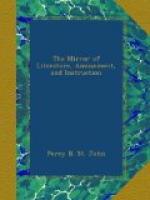SIR,—Sometime ago I wrote to you to send me a ream of foolscap, which I begged might be sent without delay, as it was for the purpose of writing out my Christmas bills. I think you must have forgotten me; and if I do not have the paper soon, I may wear a fool’s-cap on account of not having my bills out in time. Mr. ——, who, in your absence, must sustain the greatest weight of business, and is, as I may say, the Atlas of your house, was the person I chiefly depended on. As for Mr. ——, one of your household, he dresses in royal purple, and being but in a medium way between sickness and health, was drinking imperial when I saw him, and therefore did not in-quire about the business; nor did I choose to come cap in hand to a gentleman that seemed as stately as an elephant, though to my thinking he is a bundle of conceit, all outside show; in short, a piece of lumberhand, on whom I would not waste paper to write him a note.
My journeyman, who is but a demy sort of a chap, will make but a small hand of the bills, and I shall go to pott. You also will be a sufferer, if you post-pone sending my paper, for you shall have neither plate paper,[1] nor a single crown, no, nor a cartridge of halfpence from me this half year, unless you play your cards better. I have more bills to write out than a bag cap, made of the largest grand eagle you have in your warehouse, could contain; so that I shall look as blue as your sugar-paper, and bestow on you to boot some very ugly prayers, not in single hand, but by thick and thin couples, that will be a fine copy for my young man to take example by, if you disappoint.
Your humble servant, J. J.
[1] Bank notes.
* * * * *
RUSTIC SIMPLICITY.
A village pastor was examining his parishioners in their Catechism. The first question in the Heidelberg Catechism is this: “What is thy only consolation in life and in death?” A young girl, to whom the pastor put this question, laughed, and would not answer. The priest insisted. “Well, then,” said she, at length, “if I must tell you, it is the young shoemaker, who lives in the Rue Agneaux.”
* * * * *
TALL PEOPLE.
The king of France, being at Calais, sent over an embassador, a verie tall person, upon no other errand but a complement to the king of England. At his audience he appeared in such a light garb, that afterwards the king ask’d Lord-keeper Bacon “what he thought of the French embassador?” He answer’d, “That he was a verie proper man.”—“I,” his majestie replied, “but what think you of his head-piece? is he a proper man for the office, of an embassador?”—“Sir,” returned he, “it appears too often, that tall men are like high houses of four or five stories, wherein commonlie the upper-most room is worst-furnished.”




